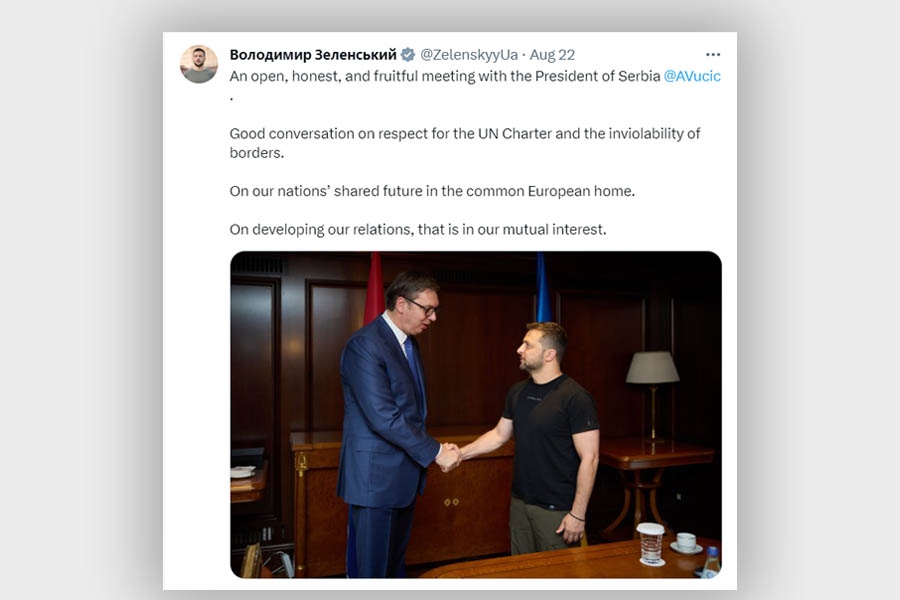It would be naive to expect that the meeting between Vucic and Zelensky will lead to a swift shift in Serbias foreign policy course, including changes in the public opinion that predominantly favors Russia. However, it does indicate a suggestion that Serbias "train (trajectory)" (referred to nearly a decade ago by the former rapporteur of the European Parliament for Serbia, David McAllister) is moving away from Moscow and towards the West.
After their conversation, the messages conveyed by the presidents of Serbia and Ukraine simultaneously demonstrate that the "strategic patience" approach towards Serbia, being implemented by the current U.S. administration, is yielding results, regardless of specific criticisms from the West directed towards Washington. The U.S. Ambassador to Serbia, Christopher Hill, stated in an interview with Voice of America that he was "extremely pleased" when he saw Vucic and Zelensky sitting down to talk.

It would be naive to expect that the meeting between Vucic and Zelensky will lead to a swift shift in Serbias foreign policy course, including changes in the public opinion that predominantly favors Russia. However, it does indicate a suggestion that Serbias "train (trajectory)" (referred to nearly a decade ago by the former rapporteur of the European Parliament for Serbia, David McAllister) is moving away from Moscow and towards the West.
After their conversation, the messages conveyed by the presidents of Serbia and Ukraine simultaneously demonstrate that the "strategic patience" approach towards Serbia, being implemented by the current U.S. administration, is yielding results, regardless of specific criticisms from the West directed towards Washington. The U.S. Ambassador to Serbia, Christopher Hill, stated in an interview with Voice of America that he was "extremely pleased" when he saw Vucic and Zelensky sitting down to talk.

The bilateral meeting between the presidents of Serbia and Ukraine, Volodymyr Zelensky and Aleksandar Vucic, which took place at the Athens summit of the EU-Western Balkans, or more precisely, the EU-Western Balkans - "Eastern Neighbors," overshadowed all other topics discussed by the host of the event, Greek Prime Minister Kyriakos Mitsotakis, and other participants. Zelensky once again demonstrated his mastery of "Twitter diplomacy," as the essence of his face-to-face meeting with Vucic was revealed in just one tweet. As the President of Ukraine conveyed, it was an "open, honest, and fruitful meeting, a good conversation about respecting the UN Charter and the inviolability of borders, about the common future of our peoples in a shared European home, about the development of our relations, which is in mutual interest."
The term "fruitful" used by Zelensky can be primarily interpreted in the context of indirect military cooperation between Serbia and Ukraine. Since almost the beginning of the Russo-Ukrainian conflict, sporadic claims have emerged that Serbia, despite refusing to impose sanctions on Russia due to its aggression in Ukraine, is clandestinely involved in supplying ammunition to Kyiv. Zelenskys tweet also clearly indicates the intention of both states to join the European Union. At the same time, the phrase "development of our relations" could be interpreted as Serbias readiness to gradually align with the Unions standard foreign and security policy. Ultimately, this could entail agreeing to impose sanctions on Russia and participating in the post-war reconstruction of Ukraine within a joint plan of Ukraines allies.
Serbias willingness to join such efforts is further confirmed by the words of Prime Minister Ana Brnabic, who participated in the Crimea Platform Summit via video link on Wednesday, August 23rd, just two days after the summit in the Greek capital.
Brnabic, among other things, expressed her regret for the suffering endured by Ukraine and its people and promised, "We will continue to pay special attention to the humanitarian situation in Ukraine, as evidenced by our recent decision to donate goods and medicines to alleviate humanitarian suffering." Significantly, Serbias state-controlled media did not report a single word from the Prime Ministers speech. The Serbian Foreign Minister, Ivica Dacic, denied the claims made by certain Ukrainian media that our country had joined the Crimea Platform – an international diplomatic initiative for consultations and coordination initiated by Ukraine, after two days of silence. As he explained on TV Pink: "Serbia did not join the Crimea Platform or sign the declaration. The Prime Minister participated in the summits proceedings via a video message. Still, we did not endorse or accept the text of the Crimea Platform because it goes beyond the acceptable frameworks."
It is not coincidental that the Ukrainian President mentioned "respect for the UN Charter" in his tweet. Zelensky highlighted that he and Vucic share an awareness of mutual acceptance of the territorial integrity of both countries. This stance gets additional significance when considering recent announcements by certain Ukrainian parliamentarians that Ukraine should recognize Kosovo.
Therefore, the Zelensky-Vucic meeting, held in the context of commemorating the 20th anniversary of the Thessaloniki Summit, where the Western Balkan countries were told that the doors of the European Union were open for them (a goal that, as well-known to all, remains unfulfilled), represents a win-win situation for the Presidents of both Serbia and Ukraine. Nevertheless, suppose we were to weigh the achieved benefits on a diplomatic scale. In that case, it gives the impression that this conversation is currently more significant for Serbia, to the extent that it could even be called historical. After the meeting with Zelensky, Vucic revealed that the Ukrainian President was interested in understanding why public opinion in Serbia is as it is (pro-Russian). "I had an open conversation with Zelensky; he asked how people in Serbia think and why it is so. I reiterated that Serbia respects Ukraines territorial integrity," said the Serbian President, who confirmed that future cooperation was also discussed, and Serbia will support Ukraine on its European path.
What Vucic certainly didnt tell Zelensky but is evident to any even remotely objective observer of Serbias media landscape is that the state of public opinion, which is predominantly pro-Russian and simultaneously anti-Western, is essentially a result of persistent propaganda by Serbian authorities over the past decade. Such a campaign is delivered by many media outlets, ranging from the public broadcaster and national channels to pro-government tabloids. Nevertheless, the media landscape has been somewhat changing recently. As an illustration, the pro-regime TV Pink has started openly promoting "American values."
It would be naive to expect that the meeting between Vucic and Zelensky will lead to a swift shift in Serbias foreign policy course, including changes in the public opinion that predominantly favors Russia. However, it does indicate a suggestion that Serbias "train (trajectory)" (referred to nearly a decade ago by the former rapporteur of the European Parliament for Serbia, David McAllister) is moving away from Moscow and towards the West. After their conversation, the messages conveyed by the presidents of Serbia and Ukraine simultaneously demonstrate that the "strategic patience" approach towards Serbia, being implemented by the current U.S. administration, is yielding results, regardless of specific criticisms from the West directed towards Washington. The U.S. Ambassador to Serbia, Christopher Hill, stated in an interview with Voice of America that he was "extremely pleased" when he saw Vucic and Zelensky sitting down to talk.
The essence of the strategy towards Serbia advocated by the US administration, represented by Ambassador Hill, involves sequentially fulfilling critical points on the European path: the accelerated implementation of the Belgrade-Pristina Agreement, continued diversification of gas supply, and gradually joining packages of sanctions against Russia. Regarding implementing the Belgrade-Pristina Agreement, the process has stalled mainly due to the refusal of Kosovos Prime Minister, Albin Kurti, to establish the Association of Serbian Municipalities. However, even to this staunch politician, its clear that if he maintains the current direction, he wont be able to stay in power for much longer, considering the growing dissatisfaction of Kosovo Albanians with his government and the undeniable desire of both Washington and Brussels to untangle the Kosovo knot finally.
Furthermore, in the coming months and years, Serbia will gradually free itself from the "firm energy embrace" of Russia, primarily through the continued diversification of its gas supply. According to official announcements, the Serbia-Bulgaria gas interconnector is expected to be completed in October. Serbias main argument against imposing sanctions is its energy dependence on Russia. Although in the current circumstances, it doesnt seem likely that Serbia will immediately heed the repeated pleas from the US and the West to impose sanctions on Russia, its expected that this will happen gradually after the next parliamentary elections, which will likely be early elections.
Lastly, it would be naive to believe that the United States and the EU will stop urging the Serbian authorities to establish a "fully functional democracy" in our country. No matter how much the other items on Washingtons agenda might seem more important, the question of democracy in Serbia will again come to the forefront as soon as the "most critical issues" are resolved, such as Kosovo and sanctioning Russia.
In all societies there are issues that are rather being skipped. Certain...
The neoliberal path, started in 2001, has led to especially bad results in Serbi...
For centuries, the region was subsumed within the Ottoman and Hungarian Empires,...
"Serbia has returned to the systemic and anti-systemic position of the political...
In reality, Serbia is closer than ever to NATO. In the course of the last five y...